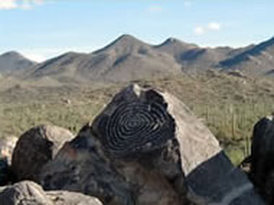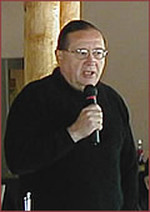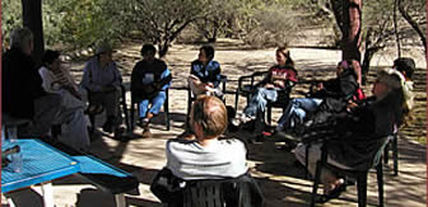2002 TUCSON
After the successful inaugural Word and World School in Greensboro, NC in the Spring of 2002, the second School convened in Southwest that Fall, again bringing together the “seminary, sanctuary and streets.” Some 75 faith-based activists gathered for a week of analysis, exposure, worship and community-building in the spectacular and painful landscapes of southeastern Arizona.
The theme of the Tucson School was the struggle for justice and compassion in the borderlands. We heard from Native Americans about centuries of resistance to European colonization; from Sanctuary activists about their efforts to offer biblical refuge to those fleeing the U.S. war in Central America during the 1980s; from farmworkers and Chicano activists about the history of Latino struggles for human, civil and worker rights; and from community organizers addressing contemporary issues of neighborhood justice.
We visited a variety of border-lands sites where people of faith are working for restoration of land, culture and dignity, and enjoyed stunning vistas of the Catalina Mountains from the Ramada Grande of Camp Hacienda. The School heard from prominent leaders such as Dolores Huerta, co-founder of the United Farm Worker movement, (shown above with Nelson Johnson at left and Ched Myers) Native American theologian Tink Tinker, Hebrew Bible scholar Norman Gottwald, author Demetria Martinez and Presbyterian Sanctuary conspirator Rev. John Fife. Participants wrestled with a variety of issues in seven Bible studies and seven afternoon classes. And we prayed, sang and danced in celebration of the gospel vision.
We believe that this second School, held in a completely different context, has demonstrated the power of Word and World as a “movable feast,” organized by a unique local, regional and national collaboration. We are deeply grateful to the local organizers and hosts, and look forward to the Third School, planned for Philadelphia, PA from June 7-14, 2003.
Components:
The theme of the Tucson School was the struggle for justice and compassion in the borderlands. We heard from Native Americans about centuries of resistance to European colonization; from Sanctuary activists about their efforts to offer biblical refuge to those fleeing the U.S. war in Central America during the 1980s; from farmworkers and Chicano activists about the history of Latino struggles for human, civil and worker rights; and from community organizers addressing contemporary issues of neighborhood justice.
We visited a variety of border-lands sites where people of faith are working for restoration of land, culture and dignity, and enjoyed stunning vistas of the Catalina Mountains from the Ramada Grande of Camp Hacienda. The School heard from prominent leaders such as Dolores Huerta, co-founder of the United Farm Worker movement, (shown above with Nelson Johnson at left and Ched Myers) Native American theologian Tink Tinker, Hebrew Bible scholar Norman Gottwald, author Demetria Martinez and Presbyterian Sanctuary conspirator Rev. John Fife. Participants wrestled with a variety of issues in seven Bible studies and seven afternoon classes. And we prayed, sang and danced in celebration of the gospel vision.
We believe that this second School, held in a completely different context, has demonstrated the power of Word and World as a “movable feast,” organized by a unique local, regional and national collaboration. We are deeply grateful to the local organizers and hosts, and look forward to the Third School, planned for Philadelphia, PA from June 7-14, 2003.
Components:
- Tucson Courses, Factulty and Roundtables
- Tucson Site Visits and Plenary Sessions
- Music, Poetry and Celebration
- Tuscon Circle of Support
- Participant Comments
TUCSON COURSES, FACULTY AND ROUNDTABLES
Following is a list of the Tucson Word and World faculty and classes offered:
Morning Bible Studies
Morning Bible Studies
Jubilee and the Struggle for Life: Ross and Gloria Kinsler
The Acts of the Apostles and the Movement for Economic Justice: Anthony Ricciuti, with Nelson Johnson
Church As Movement, 101: Core Biblical Texts: Kazi Joshua, with Joyce Hollyday, Ched Myers and Bill Wylie Kellermann
Reading the Bible with the Poor: Bob Ekblad, with Lily Mendoza and Uncas McThenia
Reading Exodus in the First World: Laurel Dykstra, with Rose Berger
The Discipleship of Women in the Synoptics [in Spanish]: Engracia Robles Robles and Carmen JuliaSegura Méndez
Confronting Conquest in Joshua & Judges: Norman Gottwald, with Jim Perkinson and Tink Tinker
Afternoon Courses
Movement History as Biography: moderated by Dee Dee Risher | Tink Tinker, Nelson Johnson, Dolores Huerta, and Norman Gottwald each related their life journeys of faith and activism
Culture, the Arts and Social Change: Jim Perkinson and Lily Mendoza
Streams of Radical Theological Reflection: moderated by Bill Wylie Kellermann | Nelson Johnson on the Civil Rights/Freedom School tradition; Uncas McThenia on Bonhoeffer, Berrigan and Stringfellow’s respective experiments with “underground seminaries”; Demetria Martinez and Ched Myers on the tradition of liberation theology and base community reflection; and Joyce Hollyday on Christian feminism and the womanchurch movement
Globalization and the Borderlands: Issues of Immigrant and Worker Justice: Rick Ufford-Chase, with Uncas McThenia, Pola Pantoja and Elisa Ortega
Church-based Movement Building and Civil Initiative: John Fife, with Joyce Hollyday
Jim Corbett: Visions of the Peaceable Kingdom in the Sonora Wildlands: Daniel Baker, with Rose Berger
Immigrant Human Rights: A Journey: Roberto Martinez, Dolores Huerta, and Alex Nava
TUCSON SITE VISITS AND PLENARY SESSIONS
Getting to Know the Borderlands. . .
On Sunday local organizers offered five day-long site visits to give participants different perspectives on the bioregion, its history, cultures and issues of justice.
South Tucson
This exposure began with worship at Santa Cruz parish, then visited neighborhoods in South Tucson that are organizing with Pima County Interfaith Organizing Committee to overcome the worst afflictions of urban poverty and violence.
Nogales, Mexico
Participants went on a BorderLinks “ minitour ” of Nogales , visiting the community center there, touring a maquiladora park, and meeting and worshipping with border residents.
San Xavier, Rancho Chukshon and Saguaro National Park
This trip began with a traditional Roman Catholic mass at the San Xavier Mission on the Tohono O’odham Indian Reservation, followed by a discussion with the Franciscan padre there, then went on to visit briefly Rancho Chukson, and ended with a drive/walk through Saguaro desert park.
Cascabel
This group visited the San Pedro River, joining the Cascabel Worship Group in Hot Springs Canyon for Quaker Meeting, discussing the work of Saguaro Juniper and Cascabel Hermitage Association folks concerning “Earth Rights” and “Land Redemption,” and touring their desert-adapted shelters and retreat facilities.
Southside Church and Humane Borders
After worship at Southside Presbyterian Church, the group discussed Sanctuary work with church members, and then drove out into the desert to look at some water tanks placed by Humane Borders — where they encountered and helped several undocumented immigrants who had been robbed and abandoned!
Each class day had a late morning plenary session that featured panels discussing different themes related to the Southwest.
Monday: Cycles of Conquest and Resistance
Dr. Tink Tinker, professor of American Indian Cultures and Religious Traditions at Iliff School of Theology and member of the Osage tribe talked about traditions of native resistance to European domination over the centuries. Three persons responded: Roberto Martinez, an immigrant rights and border human rights activist, from San Diego addressed how border issues affect Indian tribes; Lupe Castillo, history professor from Pima Community College, discussed local traditions of native resistance; and Robert Two-Bulls, a Lakota from South Dakota currently serving as Episcopal priest in the Diocese of Los Angeles, talked about Christianity and indigenous traditions.
Tuesday: Solidarity: Sanctuary and Civil Initiative
Rev. John Fife, a founder of the Sanctuary movement who was indicted by the Federal government for “smuggling” refugees, moderated a panel of people who were active in the movement in different contexts. Miriam Davidson, a local author and chronicler of the Sanctuary movement, discussed how and why she wrote about her experience; Rick Ufford-Chase, founder of Borderlinks, talked about the principles of civil initiative as articulated by Jim Corbett and others; Pat Corbett, member of the Saguaro Juniper Covenant, told some hilarious and poignant stories about her husband Jim and his journey toward Sanctuary; Gloria Kinsler, former missioner in Guatemala told about her work there and in Los Angeles with transporting refugees; and Bob Ekblad, former missioner in Honduras and founder of The People’s Seminary in northwest Washington state overviewed his continuing work with “economic refugees” from Latin America today.
Thursday: La Raza: Chicano and Farmworker Struggles
Dolores Huerta overviewed the history of the United Farm Worker’s movement and her role, along with Cesar Chavez, in founding it, and also noted highpoints in the development of Chicano activism during the 1960s and 70s. Two persons responded: Cami Juárez, local immigrants’ rights activist and victim of pesticide poisoning talked about the situation of local farm workers, and Demetria Martinez, a poet and author from Albuquerque, related her story of growing up Chicana in New Mexico, and the difficult issues of language and skin color among Latinos/Latinas (pictured above, left to right).
Friday: Community Organizing: Current Issues
Rev. Stuart Taylor, local Presbyterian minister and Pima County Interfaith Committee organizer, moderated a panel, which featured Frank Pierson (below, middle), PCIC head, who overviewed the principles and history of the Industrial Areas Foundation. Three persons responded: Rev. Nelson Johnson (below, right), long time labor rights and racial justice organizer from Greensboro, NC talked about the importance of building the beloved community; Amanda Sapir (below, left), an organizer for the Southern Arizona Alliance for Economic Justice movement talked about worker justice locally; and Frank Courtney, another PCIC organizer, spoke about his work.
On Sunday local organizers offered five day-long site visits to give participants different perspectives on the bioregion, its history, cultures and issues of justice.
South Tucson
This exposure began with worship at Santa Cruz parish, then visited neighborhoods in South Tucson that are organizing with Pima County Interfaith Organizing Committee to overcome the worst afflictions of urban poverty and violence.
Nogales, Mexico
Participants went on a BorderLinks “ minitour ” of Nogales , visiting the community center there, touring a maquiladora park, and meeting and worshipping with border residents.
San Xavier, Rancho Chukshon and Saguaro National Park
This trip began with a traditional Roman Catholic mass at the San Xavier Mission on the Tohono O’odham Indian Reservation, followed by a discussion with the Franciscan padre there, then went on to visit briefly Rancho Chukson, and ended with a drive/walk through Saguaro desert park.
Cascabel
This group visited the San Pedro River, joining the Cascabel Worship Group in Hot Springs Canyon for Quaker Meeting, discussing the work of Saguaro Juniper and Cascabel Hermitage Association folks concerning “Earth Rights” and “Land Redemption,” and touring their desert-adapted shelters and retreat facilities.
Southside Church and Humane Borders
After worship at Southside Presbyterian Church, the group discussed Sanctuary work with church members, and then drove out into the desert to look at some water tanks placed by Humane Borders — where they encountered and helped several undocumented immigrants who had been robbed and abandoned!
Each class day had a late morning plenary session that featured panels discussing different themes related to the Southwest.
Monday: Cycles of Conquest and Resistance
Dr. Tink Tinker, professor of American Indian Cultures and Religious Traditions at Iliff School of Theology and member of the Osage tribe talked about traditions of native resistance to European domination over the centuries. Three persons responded: Roberto Martinez, an immigrant rights and border human rights activist, from San Diego addressed how border issues affect Indian tribes; Lupe Castillo, history professor from Pima Community College, discussed local traditions of native resistance; and Robert Two-Bulls, a Lakota from South Dakota currently serving as Episcopal priest in the Diocese of Los Angeles, talked about Christianity and indigenous traditions.
Tuesday: Solidarity: Sanctuary and Civil Initiative
Rev. John Fife, a founder of the Sanctuary movement who was indicted by the Federal government for “smuggling” refugees, moderated a panel of people who were active in the movement in different contexts. Miriam Davidson, a local author and chronicler of the Sanctuary movement, discussed how and why she wrote about her experience; Rick Ufford-Chase, founder of Borderlinks, talked about the principles of civil initiative as articulated by Jim Corbett and others; Pat Corbett, member of the Saguaro Juniper Covenant, told some hilarious and poignant stories about her husband Jim and his journey toward Sanctuary; Gloria Kinsler, former missioner in Guatemala told about her work there and in Los Angeles with transporting refugees; and Bob Ekblad, former missioner in Honduras and founder of The People’s Seminary in northwest Washington state overviewed his continuing work with “economic refugees” from Latin America today.
Thursday: La Raza: Chicano and Farmworker Struggles
Dolores Huerta overviewed the history of the United Farm Worker’s movement and her role, along with Cesar Chavez, in founding it, and also noted highpoints in the development of Chicano activism during the 1960s and 70s. Two persons responded: Cami Juárez, local immigrants’ rights activist and victim of pesticide poisoning talked about the situation of local farm workers, and Demetria Martinez, a poet and author from Albuquerque, related her story of growing up Chicana in New Mexico, and the difficult issues of language and skin color among Latinos/Latinas (pictured above, left to right).
Friday: Community Organizing: Current Issues
Rev. Stuart Taylor, local Presbyterian minister and Pima County Interfaith Committee organizer, moderated a panel, which featured Frank Pierson (below, middle), PCIC head, who overviewed the principles and history of the Industrial Areas Foundation. Three persons responded: Rev. Nelson Johnson (below, right), long time labor rights and racial justice organizer from Greensboro, NC talked about the importance of building the beloved community; Amanda Sapir (below, left), an organizer for the Southern Arizona Alliance for Economic Justice movement talked about worker justice locally; and Frank Courtney, another PCIC organizer, spoke about his work.
MUSIC, POETRY AND CELEBRATION
Monday evening’s Community Forum at the Hacienda featured a performance by the Ballet Folklorico La Paloma, followed by a welcome from national Steering Committee members Kazi Joshua and Luzdy Stuckey. Tink Tinker talked about doing theology as a native activist; village poet Jim Perkinson read some energetic pieces, and “Big Jim” Griffith spoke of Spiritual Traditions of the Borderlands. Village diva Ange Smith closed with a song, which led into a celebration party for her new CD release “Hope in the Dark”, as well as for new books by School faculty Laurel Dykstra (Set Them Free: The Other Side of Exodus) and Jim Perkinson (Dreaming Moorish).
Wednesday evening’s Community Worship at Southside Presbyterian Church began with a Teach-In sponsored by Southern Arizona Economic Action for Justice entitled “Who are the Enrons of Tucson? Building Community: Resistance to Corporate Greed.” Dolores Huerta spoke along with other local organizers. This was followed by some rockin’ music by the Tucson Arizona Mass Choir, who was joined by Ange Smith. Rev. Joyce Hollyday presided over worship, which featured a ritual of “passing the torch/rekindling the Light: from Greensboro to Tucson” (pictured above); Sanctuary journalist Demetria Martinez reading from her novel Mother Tongue; a sermon by Dolores Huerta; and a much-anticipated reprise by Ange and the Southside Choir of “His Eye is on the Sparrow,” which brought the house down as it did in Greensboro. Ange’s CD is available from Sojourners (www.sojo.net/resources) for $12.00. Proceeds benefit Word and World.
Wednesday evening’s Community Worship at Southside Presbyterian Church began with a Teach-In sponsored by Southern Arizona Economic Action for Justice entitled “Who are the Enrons of Tucson? Building Community: Resistance to Corporate Greed.” Dolores Huerta spoke along with other local organizers. This was followed by some rockin’ music by the Tucson Arizona Mass Choir, who was joined by Ange Smith. Rev. Joyce Hollyday presided over worship, which featured a ritual of “passing the torch/rekindling the Light: from Greensboro to Tucson” (pictured above); Sanctuary journalist Demetria Martinez reading from her novel Mother Tongue; a sermon by Dolores Huerta; and a much-anticipated reprise by Ange and the Southside Choir of “His Eye is on the Sparrow,” which brought the house down as it did in Greensboro. Ange’s CD is available from Sojourners (www.sojo.net/resources) for $12.00. Proceeds benefit Word and World.
TUCSON CIRCLE OF SUPPORT
ELDERS
Alma Purvis , Elaine Emily, Uncas McThenia, Robert Miller Rose and Marie Berger
HEALERS
Elaine Emily and Amanda Sapir
WORSHIP LEADERS
Rose Marie Berger, Sara Meza andd Corrine Dedini
MUSICIANS/POETS
Ange Smith , Kate Stevens, Demetria Martinez , Rose Marie Berger and Jim Perkinson
Local Committee Organizers
Heather Craigie , Corinne Dedini , John Fife, Sara Meza , Amanda Sapir , Luzdy Stucky , Stuart Taylor and Rick Ufford-Chase
National Administrative Coordinator for the Tucson School
Deborah Lee
Special thanks to BorderLinks, Saint Mark’s Presbyterian Church, and Southside Presbyterian Church for their help in making the Tucson School a success.
Alma Purvis , Elaine Emily, Uncas McThenia, Robert Miller Rose and Marie Berger
HEALERS
Elaine Emily and Amanda Sapir
WORSHIP LEADERS
Rose Marie Berger, Sara Meza andd Corrine Dedini
MUSICIANS/POETS
Ange Smith , Kate Stevens, Demetria Martinez , Rose Marie Berger and Jim Perkinson
Local Committee Organizers
Heather Craigie , Corinne Dedini , John Fife, Sara Meza , Amanda Sapir , Luzdy Stucky , Stuart Taylor and Rick Ufford-Chase
National Administrative Coordinator for the Tucson School
Deborah Lee
Special thanks to BorderLinks, Saint Mark’s Presbyterian Church, and Southside Presbyterian Church for their help in making the Tucson School a success.
PARTICIPANT COMMENTS
“I want to applaud the Tucson Word and World School. My high expectations were met; sometimes exceeded. A really excellent tapestry of people, art, intellect, emotion, soul, ecology, faith.” “The Tucson school was a great event. It is continuing to pull me into uncharted territory that, if left to my own devices, I would continue to circumvent.I suspect that I am only beginning another new experience with God. I had no intention of becoming a pastor, nor working with immigrants and I certainly never set out to be an activist. My, the places we get lured into.” |
“Amazing and powering!” “ I gained tremendously from the whole encounter and was impressed with what seemed to me to be some of the “faithful remnant” of the ecumenical churches. I encourage you to lend your support in whatever manner that you feel led.” “It was truly an educational and inspiring experience for which I am most grateful. Being somewhat new to this dialogue, I was overwhelmed by the quality of interesting and committed folks who came to Tucson for the school. I look forward to participating in a future school.” |
“I want to speak to the heart. “Word and World” IS needed – its time has come. This movement is very important. It has the potential to transform/ change us individually – and the ministries we serve, – and even the world. You did an incredible piece of work. Even the things that ‘didn’t quite work’ have lessons in them. My life will be different because of Tucson.” “I think everything was just about as well done as could be done. It was better than expectation would permit.” |



